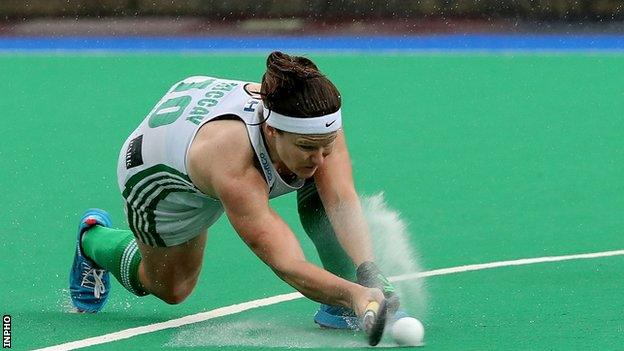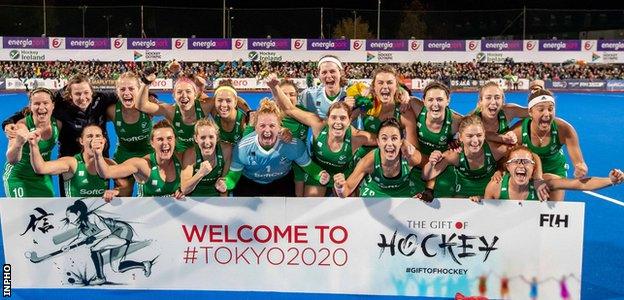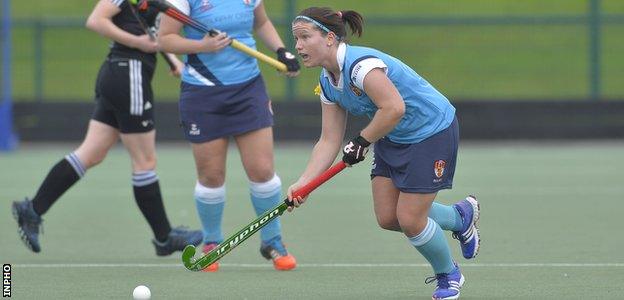Slipping through the cracks: Ulster hockey fears crisis could halt national momentum
- Published

Shirley McCay is Ireland's most capped sportswoman with 305 international appearances
The prolonged break from activity has not come at a good time for any sport, but perhaps in an Irish context there is no sport more frustrated to be put on the backburner than hockey.
In reaching the 2018 World Cup final, the Irish women's team made the sort of breakthrough that catapulted not just their team, but their game into the national consciousness in a way that it had not been before.
With a penchant for high-drama on the field and a notable bond off it, the squad continued to thrill their ever-growing fanbase as they clinched Olympic qualification.
It has taken a global pandemic to stop the momentum of Irish hockey, with the Tokyo games postponed until next year.
"Hockey has been riding on the crest of a wave over the past couple of years," says Shirley McCay, Ireland's most capped sportswoman.
"The profile has really risen and it's a shame that we were building to that massive crescendo.
"It's a shame that we'll not get to see what the summer had to bring."
With 305 international appearances in the bank, McCay was hoping to add another line onto an impressive CV in Japan.

Ireland's women qualified for the Olympics for the first time last November
As an Ulster hockey talent scout, no-one is better placed to consider how events at the top of the game trickle down to the grassroots of the sport.
There is a trend developing in hockey where increased youth participation is somewhat counteracted by a drop-off in the number of adults playing.
With all activity indefinitely postponed, McCay fears that the current situation may only accelerate the decline in senior players.
"Numbers at adult level are going down, particularly on our men's side where we are losing teams year on year," says McCay.
"This pandemic has made a few players, coaches, volunteers and umpires consider their health and how fruitful hockey will be when it gets back up and running.
"How much time will volunteers be able to give back to club when they themselves are back at work and there's not as much spare cash floating around?"
Lack of end date a worry for hockey clubs - McCay
This week has brought positive news for the sports world with activities where social distancing can be easily maintained such as golf, tennis and angling given the green light to resume under restrictions.
However hockey, while listed as a non-contact sport, will have to wait some time before its resumption.
"Hockey doesn't fall into any one category because it's not necessarily a contact sport in the way that rugby is," says McCay.
"But it's not golf or tennis in that there is a certain element of contact."
Summer months key in fundraising process
While financial difficulties are consistent across all sports at the moment, hockey's problems are perhaps less to do with the senior sides being unable to play as they are in football, rugby and GAA.
"Maybe hockey is at a benefit where we don't depend a huge amount of thousands of people coming to a club game at the weekend," McCay says
"But often the junior teams fund the senior team, that lack of income will have massive repercussions for season to come.
"The longer it goes on, the less income is being generated and the more problematic it becomes."
Despite plans to gradually ease the lockdowns in both Northern Ireland and the Republic of Ireland, the pandemic is set to keep normal service within sport on hold for, in most cases, the vast majority of the summer.

McCay is concerned that the prolonged break may have a long-term impact adult participation figures in Ulster hockey
The summer months are typically when most clubs look to take care of their finances, often acquiring enough money to see them through the next season.
"During a summer break a lot of clubs would do summer camps, and it's a big time of year in terms of fundraising, annual dinners and awards nights," McCay explains.
"Those are often the events that raise the money for the seasons to come and the seasons before."
Currently there are no Ulster hockey clubs that have received any government funding aside from the £2,000 sports Hardship Fund during the Covid-19 crisis.
Falling short of the rateable value required to receive the retail, tourism and leisure grant leaves has left the clubs scrambling to ensure their existence for when they can eventually return to activity.
"Honestly the clubs are surviving with a lot of difficulty," says McCay.
"Regardless if you're a club with your own property or one relying on someone else, they both bring their own challenges.
"Clubs that exist on their own have the upkeep of their own clubhouse and are at a loss in terms of their bar takings."
With no set date for a return to action, Ulster hockey are hoping for enough financial assistance to ensure the sport can pick up where it left off in terms of youth participation and national coverage when such a time comes.